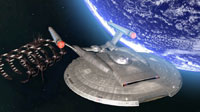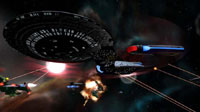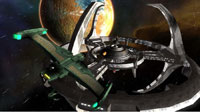

Star Trek Legacy Review 242
Since late last month, I've been playing with the Xbox 360 title Star Trek Legacy. The fact that it is not a great game should be no surprise. Despite some entertaining plot elements, the title's gameplay leaves a lot to be desired. What is confusing, and troubling, is that this is just the latest in a long line of disappointing Trek games. Looking back on the history of Star Trek gaming, games like Elite Force or A Final Unity stand out from a disturbingly large field of titles that over-promise and under-deliver on the well-loved Trek universe. Why is it so hard to make a good Trek game? Why do developers keep trying and failing? Why is there a Vulcan leading the Borg? Read on for consideration of each of these questions, and a review of Star Trek Legacy to boot.
- Title: Star Trek Legacy
- Publisher: Mad Doc Software
- Developer: Bethesda Softworks
- System: 360 (PC)
As so often happens with a Trek title the premise, at least, is compelling. Commanding a task force of up to four ships, you follow a fairly coherent plot from the "Enterprise" era all the way through to the time of Jean-Luc Picard and Benjamin Sisko. You can choose between a number of ship classes to include in your fleet, and gameplay consists of real-time ship-to-ship battles. The actors who portrayed the captains in the various eras make a return, offering their vocal talents and a feel of authenticity to the proceedings.
What sounds like a can't-miss formula, though, inevitably flies past the target at full impulse. Ship and fleet control is the most notable failure, and results in individual combat moments requiring more effort than feels right. I found fleet combat most frustrating, as it is so variable how your actions are interpreted. When you begin a mission, all four of your ships are taking orders from you at the same time. Selecting a enemy for combat (by hitting the right shoulder button and cycling through the available options) is intuitive and quick. When all four ships are following your orders, this results in a focused barrage that effectively neutralizes targets. The problem comes when ships begin 'thinking' on their own.
It was never clear to me what prompted this, though I know that giving individual ships orders via the overhead tactical display (available via the 'select' button) always 'broke up' the fleet's command. This is problematic, as the 2D overhead display is the best way to keep track of the action on the sometimes dauntingly large 3D space maps Legacy uses. Indeed, the z-axis is used in the game (unlike in the show), making it hard to keep track of enemy ships on occasion. These are challenges, though, to be overcome: the frustration sets in when order-less ships choose to sit dead in space and absorb phaser hits without retaliating. That's some extremely poor decision-making on the part of the AI, and can mean the difference between success and failure in a large and frantic naval battle.
Another, subtle frustration is the pathing your friendly ships use when circling a target. While sometimes ships do 'the right thing' and orbit their prey at an appropriate range, trying to keep weapons locked on the target at all times, that's not always a given. Often, ships locked onto a target attempt something I can best refer to as a 'strafing run', where they move directly at a target, allowing firing on the enemy for a brief period of time, before overshooting and swinging around for another pass. Overshot on targets can sometimes be quite some distance, resulting in a long delay between assaults on enemy ships. This style of attack is particularly frustrating when attacking immobile targets like space stations and asteroids, as AI-controlled ships tend to fly right into their prey and sort of bounce off. Given the finicky targeting you're allowed to use, this greatly reduces an AI-controlled ship's effectiveness against such a target. In a pitched battle, which is almost all of them, it just becomes frustrating to have to keep so many balls in the air.
That's a shame, too, because combat is actually a lot of fun when things are moving in the right direction. It's extremely easy to jump from ship to ship within your fleet, simply by pressing one of the four directions on the D-pad. This can (generally) allow you to keep all four of your ships active and flying straight. Weapon use is as simple as right trigger for phasers, left for photons. The game does a good job of informing you when weapons can be used, both via visual HUD elements and vocal alerts. Legacy also does a great job of switching up who you're fighting, and what exactly you're doing in combat. Sending away teams onto a space station in the middle of a pitched battle, for example, or using a sensor scan to detonate an explosive keeps you on your toes and stops things from getting overly monotonous.
The plot that strings these combat elements together is all the Trek you can stand, and more, crammed into a disappointingly short timespan. There is time travel, Klingons, Romulans, Borg, and one very weird Vulcan. The plot itself is explained in detail in a comic included as an 'extra' on the game's main menu. To give you a horrible taste, it mentions V'ger, from the first Star Trek movie, in connection with the Borg's origin. Looking back on the whole story from the last mission gives you an 'ohhh' moment, but it's not that great a payoff for the amount of time you spend in the dark. Just the same, overall the story is coherently told and entertainingly written. The dialogue written for the captains is especially entertaining; even the stuff written for Shatner (who, predictably, gets the most 'screen time') is enjoyable in a scenery-chewing kind of way. Getting to hear Avery Brooks intone new lines as Benjamin Sisko was especially enjoyable, and the role DS9 gets to play near the game's end allowed me to forgive a lot of smaller oversights.
Visually, Legacy is a competent 360 title. It's certainly not Gears-pretty, but the ships are all well modeled, and it's hard to make space look ugly nowadays. Ships and stations explode nicely, though larger objects tend to look a little odd when breaking apart. Audio effects use official FX from the show, and the score consists of forgettable Trekesque tracks that back the game's sometimes-tense moments adequately.
Star Trek: Legacy, then, allows the dedicated Trek fan to experience ship-to-ship combat in a way that's never quite been captured so well before. Trekkies are sure to appreciate that new experience, as well as the vocal work of the actors-turned-captains. As a game, though, Legacy leaves a lot to be desired. Gamers are going to find the inexact fleet control and inept AI frustrating, with some missions being bang-your-head-against-the-desk annoying. The first Next Generation-era mission, Revelations, is particularly hair-pulling, and makes the lack of in-level save points sorely missed. If the lack of a new Trek show on TV is leaving you anxious, I would readily recommend Legacy as a balm to your Trekkish needs. Likewise, the game might be worth a rental of you're a 360 gamer who has already tired of Gears of War. It's just not that great a game otherwise, and can readily be given a miss for other, better games.
This leaves us with the question I posed above, though: Why is it so hard to make a good Star Trek game? It could be the difficulty of making licensed games satisfying to players outside of the 'fan' population ... but Star Wars titles like Knights of the Old Republic and Jedi Academy transcend fandom as truly great gaming experiences. Heck, even Spider-Man 2 is a better game than any Trek game I've played, and Spidey's history with gaming is a lot shorter than Star Trek's. Given the dialogue and narration-heavy storytelling that Star Trek uses, it is possible that the Trek universe just isn't a good fit for videogames? What does the lackluster performance of these latest Bethesda titles mean for future trek games? Star Trek Online, specifically, seems to have a Herculean task before it. How do you bring a license that's never seemed to be quite right for gaming to one of the most finicky of all genres, the MMOG?
What do you think? What would it take to make a great Trek game? Are there any Trek games that you think have really succeeded? What will Star Trek Online need to include in order to satisfy you?



Kirk (Score:5, Funny)
Trek Gaming Formula (Score:5, Funny)
Maybe if they made a game based on Kirk banging green chicks, they would succeed.
Re:"Why is it so hard to make a good Trek game"? (Score:5, Funny)
Them's fightin words, son.
Re:Kirk (Score:3, Funny)
Twenty bucks says the torn shirt takes him.
KFG
Re:Why is it so hard to make a good Star Trek game (Score:5, Funny)
Re:Why is it so hard to make a good Star Trek game (Score:2, Funny)
Spokish (Score:3, Funny)
What's to apologize for? When TOS series was still on the air, everybody (audience, writers, critics) agreed that Spock/Nimoy was the #1 babe magnet for the show. Women found the whole supercool hyperlogical scientist schtik thoroughly sexy. And when they started do scripts where he had to battle his inner illogical human, it just got more intense.
Or maybe you're apologizing for the image of Kirk with the torn shirt. Well, most video games with benefit from a little honest homoeroticism...
Re:Spokish (Score:3, Funny)
Re:Kirk (Score:3, Funny)
Re:Why is it so hard to make a good Star Trek game (Score:3, Funny)
So you're saying we should play Star Trek games, but only the even-numbered ones?